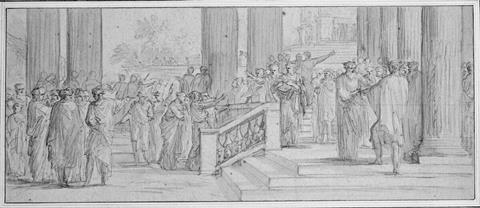Elaine Storkey unpacks Acts 6, revealing the principles that enabled the early Church to move forward after a dispute and which she urges us all to live by today
Study passage: Acts 6:1-7

Most of us don’t like hearing complaints. This is as true for manufacturers, water companies or school as it is in personal relationships. And when the complaints are about things related to church, like the preaching, the times of services, the way church is run or the lack of consultation, things can get very ‘unchristian’! Very often the leadership can see complaints as a distraction from the real job of preaching the gospel. Sometimes the response is to deny anything is wrong, or do nothing and just hope things sort themselves out. In aggravated situations, complainers can even be asked to leave and find another church. But none of these reactions produces a proper resolution. Whole fellowships have been broken up because of niggling complaints that eventually got too big to handle.
So, we shouldn’t be surprised to find that the early Church had to deal with complaints. One of them is highlighted in Acts 6. Unlike many of ours, it wasn’t about preaching, teaching, buildings or music. It was about care within the community. We learn a lot from this story about how the early Church practised integral mission and what the challenges were.
The complaint arose because people expected the preaching of the word to be accompanied by concern for their wellbeing, especially for the protection of the vulnerable and poor. The passage doesn’t list all that the Christians were already doing for each other. People took for granted that there were provisions for those without livelihoods, especially daily distributions of food and other necessities to widows and orphans. Those daily distributions must have been much harder to organise than seasonal handouts or special appeals. They would have necessitated huge planning, commitment, money and constant sharing of resources. But they did take place and were seen as a normal response to the teachings of Jesus and the apostles. So, if the expectations of care were being fulfilled, why were people complaining?
The history of the Jews
To understand the problem, we have to go further back. In Jerusalem, the Jewish community comprised Hebraic-Aramaic Jews and Greek Jews. They were all Jews in terms of religious belief, obedience to the law and the prophets, circumcision, inclusion in the covenant and so on, but their language diversity brought differences. The Greek speakers were Jews who had become historically dispersed throughout the Greek-speaking world. They knew very little Hebrew or Aramaic. They’d never needed to, because the Hebrew scriptures had been translated into their own language for two or three hundred years. When they read the Old Testament (the Septuagint) they would read it in Greek translation. So, when Jewish people became Christians it was natural that this diversity would come into the early Church. Both Hebrew and Greek speakers were converted together and the Jew-Greek distinction ran through the community.
Yet, although there was no division in theory, in practice, Hebraic Jews often regarded themselves as more authentically Jewish than their Greek counterparts. They could read the Torah in the original Hebrew and not in translation. They could also read the Aramaic biblical writers (for example Ezra and Daniel). So, their knowledge was respected and much Jewish leadership in the Church came from Hebraic circles.
No one seemed to find that an issue, but then a complaint arose which concerned the daily distributions. The Greek-speaking part of the community felt their vulnerable members were being discriminated against. Greek widows and orphans were being overlooked in the daily allocations, while the Hebraic widows were given their share. Since all the communities would have been involved in the collections for the poor, this was doubly offensive. And so the Greek-speaking Jewish converts brought their case to the apostles. You can almost hear their emotion. Centuries of feeling like second-class Jews would have bubbled easily into resentment. They were hurt that old attitudes and discriminations seemed to be being reflected in the Christian Church. The Hebraic community was being given priority over the Greeks and those in control were showing partiality.
A matter taken seriously
The twelve apostles immediately saw the issue as an apostolic matter of the first order. They didn’t try to dismiss it, or see it as a distraction, but recognised it as a question of justice within the very community that was trying to live out the gospel. So, they called all the disciples together to sort out a solution. They fully accepted that they should oversee careful supervision to the distribution. But how and when? Their time had to be given to their main calling: “It would not be right for us to neglect the ministry of the word of God in order to wait on tables” (v2).
This statement has often been misinterpreted as reinforcing a hierarchy within the early Church, where preaching takes precedence over everything else. I don’t think that’s right. As they continued with their solution, we can see that it was more an acknowledgement that multiple ministries were needed in the service of the gospel. Rather than everything falling on the shoulders of the apostolic leadership, other overseers had to be found who could fulfil the commitment of ensuring that care in the community was exercised impartially. The solution was to expand the leadership and create an elected, responsible, delegated, functional group of deacons.
Appointing new ministers
We learn a lot by looking at how they went about appointing deacons. First, they set high qualifications for these new overseers, both spiritually and intellectually. They were to be people “known to be full of the Holy Spirit and wisdom” (v3). There was no sacred-secular split here. The Holy Spirit is as necessary for those organising the daily administration to the poor as it is to those preaching the word. Clear judgement is as important in practice matters as it is to prophetic utterance and the working of miracles. Spiritual wisdom is key to sound practice in every area of leadership.
Second, the new leaders were not handpicked and groomed by any of the apostles. They were selected by their own peers, women and men in the Christian community. The Church itself had to identify and select those gifted by God for this calling. No wonder everyone was pleased with the proposal. Those who felt aggrieved had been heard and now had the opportunity to choose the people who would put the matter right. They prayed and chose and, finally, seven people of faith and the Holy Spirit were brought to the apostles. The men were named, the apostles prayed over them, laid hands on them and anointed them to their new calling in the Church. These new overseers would ensure that the Church’s mission would remain integral on all fronts. There would be no compromise.
I love the fact that Luke records the names of these seven new deacons. Notice they have Greek names: Stephen, Timon, Procorus, Nicanor, Parmenas, Nicolas, indicating that they were from the Greek-speaking community. Indeed one of them, Nicolas, from Antioch, was a convert from a pagan Greek background.
This choice of new leaders was a tacit acknowledgement by the Hebraic community that fairness needed to be maintained in the most public display. In this deliberate and definite way, offence was removed, partiality was rejected, power-bases pulled down, traditionalism was challenged, ethnic rivalry abandoned and justice put at the very heart of the new community.
How do we apply these principles today?
In almost every culture, those given power and authority are tempted to use them to suit their own ends. That’s what’s behind nepotism, keeping the power within the family, tribe, caste or social group. It’s the basis of all the systems that run on bribes, back-handers, taking a cut. It operates in the wealthiest ‘democratic’ nations as well as among depots and tyrants. Yet it was roundly condemned by the Old Testament prophets centuries ago. We are not to show partiality. We must be scrupulously fair in how resources are used. We should outlaw and punish corruption, and make sure scales are honest and allocations just.
Whenever these principles are violated the vulnerable suffer, for they never have enough power of their own to ensure they receive justice. As Christians we must work against injustice wherever it occurs. And we are to model in the Church what Paul emphasises in his letter to the Galatian Christians: that in Jesus these old patterns of injustice, discrimination and power systems are broken down: “There is neither Jew nor Greek, there is neither slave nor free, there is no male and female, for you are all one in Christ Jesus” (Galatians 3:28, ESVUK). Living with fairness and impartiality is our witness to the world.
































No comments yet